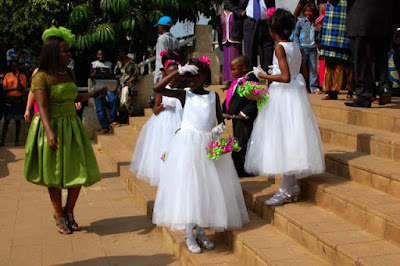

1. Don’t know the couple? Don’t worry! I knew neither pair and still received gracious smiles from the newlyweds. Provided you follow tip #4, you’re golden.

2. Arrive early. Or even on time — the wedding will probably start late. When I showed up to the first wedding ahead of schedule, I befriended a few nattily-dressed men wearing “OFFICIAL” labels affixed to their lapels. No such thing as a free lunch? Ha. A bit of pleasant conversation earned me a heaping plate of rice, meat, and relish. My still-full stomach didn’t complain when the evening meal consisted of two cold samosas, a die-sized hunk of meat, and half a plain muffin.
3. After carbo-loading, make a fool of yourself on the dance floor. Or, more precisely, in the parking lot. Here, you’ll find family and friends awaiting the couple’s arrival, shirtless drummers, and fur-clad children performing war dances. Ladies, make sure your chitenje (wrap skirt) falls off frequently — that’ll really get the guests howling. I knew some of the traditional dances, but others were unfamiliar — including one in which a single chitenje is knotted around the waists of a man and woman, locking them in choreographic, gyratory union.



4. Bring lots (and lots and lots) of small Kwacha notes. Though couples do receive gifts that would be at home in the U.S. (tableware they’ll never use and too many toasters), the wedding itself resembles a business proceeding. I zoomed out of the first wedding before the monetary donations began, but I arrived at the second with the gift-giving already underway. Four hours later, when I left, the money-fest was just ending. The MC, dressed head-to-toe in bold geometric print, summoned donors, who tossed 20 and 50 Kwacha notes into a wide wicker basket as hit Malawian songs spooled on repeat. Some notes fell to the floor and became tangled in the bride’s train. At a table to the side, three women furiously rifled through the bills and sorted them into piles. The draw can be upwards of $700, which is usually just enough to recoup the expenses of the ceremony.



5. Don’t expect cake. Though you might luck out at some ceremonies, guests at the second wedding I attended had to shell out additional Kwacha for foil-wrapped slabs the size of domino tiles. These contained not cake but sticky blocks of unidentifiable pulp (fig was our best guess).


If these tips fail, turn to those old standbys — befriend the children, admire the sumptuous attire, and estimate the intensity of the groom’s hangover.





Now go forth, merrymakers, and rejoice.



No comments:
Post a Comment